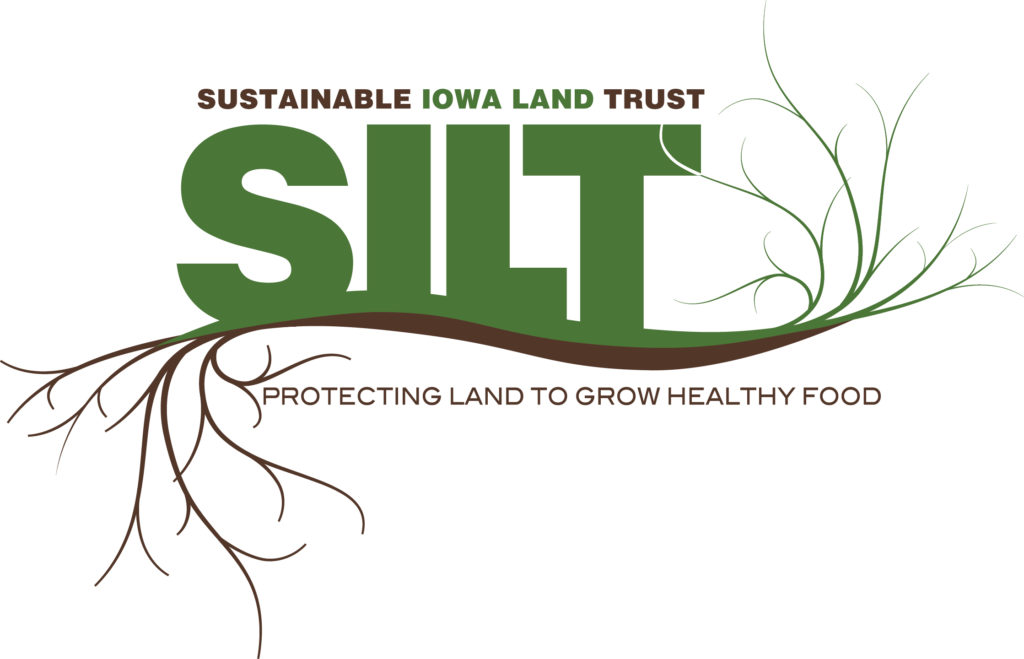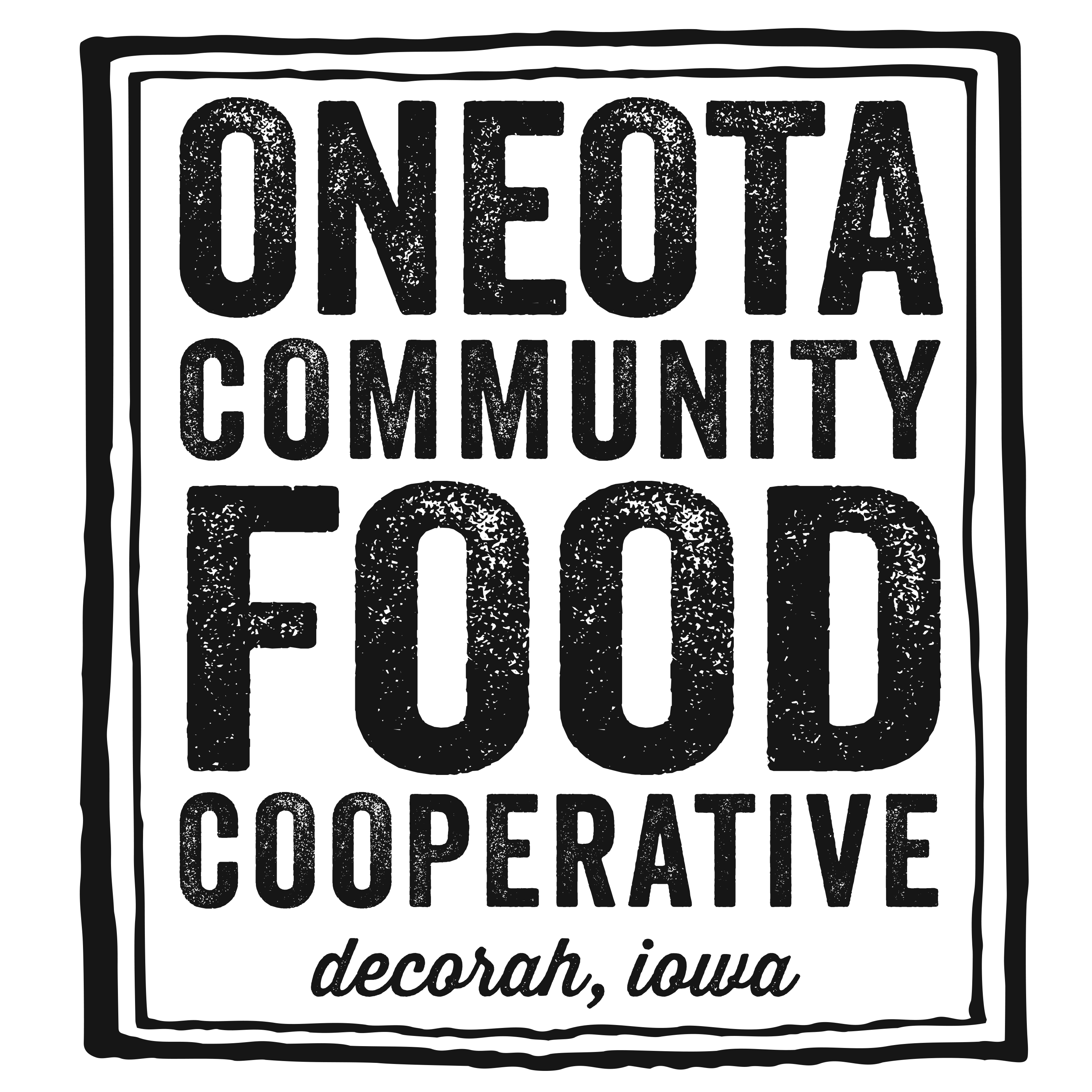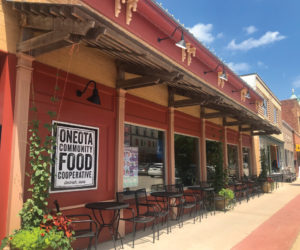 An Oneota Co-op Round Up at the Register event for Sustainable Iowa Land Trust will be held Monday, Sept. 12 through Monday, Sept. 26. Shopper round ups will be generously matched by Lyle and Sue Luzum of Decorah, who donated the 170 acre Luzum Heritage Farm to SILT in 2017. Shoppers are offered the opportunity to round to the next dollar at purchase. Additional round up amounts, up to one hundred dollars, also are an option during Co-op Round Up at the Register events.
An Oneota Co-op Round Up at the Register event for Sustainable Iowa Land Trust will be held Monday, Sept. 12 through Monday, Sept. 26. Shopper round ups will be generously matched by Lyle and Sue Luzum of Decorah, who donated the 170 acre Luzum Heritage Farm to SILT in 2017. Shoppers are offered the opportunity to round to the next dollar at purchase. Additional round up amounts, up to one hundred dollars, also are an option during Co-op Round Up at the Register events.
This donation opportunity will be held simultaneously with the organization’s annual fundraiser, SILT Fest, to be held virtually. The public is invited to follow SILT’s Facebook and Instagram accounts during Virtual SILT Fest for raffle drawings and organizational news. An in-store “tabling” event with Lyle Luzum and SILT Public Outreach VISTA member Sophie Sheeder is scheduled for Saturday, Sept. 24 at Oneota Co-op. Watch the Co-op’s social media platforms for details.
SILT’s Place in a Sustainable Future
A Conversation with Lyle Luzum, part 1
By Tanya O’Connor
Many years ago I read a book titled “Indian Creek Memories: A Sense of Place.” Its author is the late Dr. R. Clark Mallam, former Luther College professor of anthropology. Dr. Mallam recalled his childhood on the Great Plains of Nebraska. This book is a love letter to an expanse of land. It is about the power of place, its people, land and sky, and how it shapes us as human beings.
I hadn’t thought of Dr. Mallam’s book in 35 years. But I know why it’s inside of me now. I’ve had recent conversations with Lyle Luzum of Decorah and Sustainable Iowa Land Trust (SILT) Executive Director Suzan Erem. I feel the same devotion to land in them that I felt as a young student on the pages of Mallam’s book. I feel their commitment to its sustainable use, to its future, and to those who wish to honor their sense of place amidst it.
Here’s a SILT story:
Like many organizations founded by like minds seeking solutions, SILT began when a group of people passionate about sustainable agriculture in Iowa had a get-together. In 2014, these individuals sought to address one issue: what could they do, collectively, to protect Iowa’s farms so they could produce healthy food – forever?
By 2015, SILT was founded, with representation by a broad spectrum of Iowa leaders. SILT’s organizational mission, notes silt.org, included the following: access to land for beginning farmers; local food
production in the face of climate change and dwindling fossil fuel reserves; the future of the family farm; the health of our rural communities; the current massive transition in land ownership; food
security for our growing communities; expanding cities eating up prime farmland.
SILT’s very name is the core of the organization. “When silt stays where it belongs,
” notes SILT, “on our farms, through truly sustainable farming practices, it grows great food.”
Lyle, Sue and the Luzum Heritage Farm

As seasons go, it’s possible that there’s five in farming families. Aside from the cycle of nature that patterns agricultural days, there’s perhaps another. It’s a season passed through generations – sometimes one of sorrow, and sometimes one of possibility. This is called the season of “what do we do with the farm?”
 Lyle Luzum’s family farm legacy began in 1873. It’s the land he grew up on. It’s the Winneshiek County land he farmed and it’s where he and his spouse, Sue, raised their daughter Steph. The Luzum farm, notes Lyle, “is one of the oldest “conservation” farms in the county, with contour strip cropping and contour terraces dating back to 1943.” Lyle and Sue did not desire this land to “get plowed up into corn and soybeans, with a CAFO (Concentrated Animal Feeding Operation) on it.”
Lyle Luzum’s family farm legacy began in 1873. It’s the land he grew up on. It’s the Winneshiek County land he farmed and it’s where he and his spouse, Sue, raised their daughter Steph. The Luzum farm, notes Lyle, “is one of the oldest “conservation” farms in the county, with contour strip cropping and contour terraces dating back to 1943.” Lyle and Sue did not desire this land to “get plowed up into corn and soybeans, with a CAFO (Concentrated Animal Feeding Operation) on it.”
Much of the 170 acre Luzum farm had been placed in the Conservation Reserve Program (CRP) during Lyle’s years of full-time employment at Northeast Iowa Community College (NICC). Throughout his NICC career, Lyle continued to observe Iowa’s changing agricultural landscape. It was during this period that Lyle and Sue became more active in Oneota Co-op as well.
Then, in 2010, Lyle retired. He recalls, “As the years went by, my involvement with the Co-op became stronger as agriculture changed. I became involved in our local Food & Fitness Initiative. I was inspired by (at that time) the non-traditional farmers providing us all an abundance of good, sustainably produced foods at the Co-op and the Farmers Market.”
So Lyle decided to place his efforts among those who inspired him. He joined in on a “small scale,” he says, “selling lamb locally.” He considers himself lucky to be able to do so. He had 170 acres of generational land. “I certified organic,” he notes, “and did my farming thing again, with a renewed perspective about local food possibilities.”
“If you’re not born into land, it can be very difficult….”
Forward to April, 2015 and the Oneota Co-op Annual Meeting, where then GM, David Lester, had invited Suzan Erem to speak about SILT.
“Timing is everything it seems,” says Lyle. “When I heard the story of SILT’s goals (only six months old at the time) I saw hope to protect the farm for something valuable – guaranteeing that at least some land is available to grow the kind of food we wanted to eat.”
Yet it’s the “who”, in terms of the farmer, that makes these agricultural possibilities tricky. “If you’re not born into land,” Luzum notes, “it can be very difficult to find affordable access to it. And it was increasingly apparent that the people who had land were not particularly interested in producing this type of food.” This situation, he adds, “is a real mismatch of desire to participate in the local food economy and the ability to do so.”
The Luzums were aware that SILT was designed to address this mismatch. A situation is created where land is protected and where, over time, he notes, “farm owners make their land affordably available for people to grow sustainably produced table food for people.
“That was, we thought, a good legacy for our land. You can’t just wish things into existence. You have to make it happen with the resources you have available.” The key thing about a SILT farm, says Lyle, “is that it can provide affordable access to land for those with the desire to grow food (and perhaps put down roots), but without a place or financial resources to do it – and do so in a way that encourages long term investment and protects the conservation values we expect in sustainable food.”
Lyle and Sue, along with daughter Steph Hughes, and spouse, Matt, feel fortunate to have been in a position to be, as they feel, part of a solution. Steph and Matt (also Oneota Co-op member/owners) agreed to forgo their farm inheritance. In June, 2017 the 170 acre Luzum Heritage Farm was donated to SILT.
The farm’s occupants for the past four years have been Andy and Betsy Boone and their two children. The Boone family is currently in the midst of a move to Viroqua, Wis. The Luzum Heritage Farm’s new resident farmers will be Carly McAndrews and Bryant Mann. Learn more about Carly and Bryant here: https://silt.org/welcome-our-newest-farmers/.
Watch for Part 2 of the SILT conversation, in which we’ll learn about Lyle’s conservation ethic, service to the SILT board of directors, and news from SILT Executive Director Suzan Erem.
Meanwhile, I asked Lyle what each of us can do, in our own way, to foster the future SILT envisions. Here is his response:
“If you don’t have land, but value good sustainable food and a local food system – support the farmers who grow such food. Become a regular supporter of SILT – the only land trust actively currently working to protect that capability. Consistent income is needed for routine operations, so regular, periodic donations (monthly automatic ones, ideally) are extremely helpful. And costs increase each year, so remember to bump your donations to nonprofits, including SILT.”
For landowners
“If you do have land in the family and have a degree of discomfort about your future options, think about whether you (or your heirs) truly need to die with the theoretical market value of that land in your asset column. Maybe, by accepting a reduction in value through a SILT easement or land donation, you could leave a legacy to the community by making that land more easily available to someone in the future who wants to grow food but is lacking a way to do so.”
Perhaps most importantly, clarifies Lyle, “We can’t let the knowledge, desire and opportunity to grow food disappear. You may be able to be part of a satisfying solution.”



